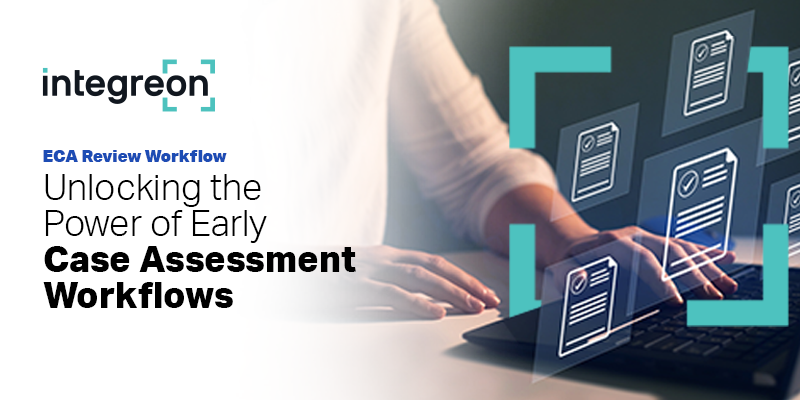Time and resources are precious commodities. Litigators are constantly searching for strategies to streamline the process, reduce costs, and eliminate distractions from their core mission of advocacy. One such approach is to ensure the implementation of effective Early Case Assessment (ECA) workflows.
What is Early Case Assessment (ECA)?
ECA is the practice of evaluating data prior to starting a full-fledged document review. The goal of ECA is to identify two buckets of data. The first bucket is the non-relevant data which can include “junk” email, Teams/Slack channels that do not contain relevant messages, email domains unlikely to be responsive, etc. The second bucket is the data likely to be relevant using conversation analysis, search term sampling, “heat maps”, etc.
By leveraging advanced technology and a systematic approach, ECA workflows enable litigators to gain a comprehensive understanding of the merits of the case immediately without needing to sift through non-relevant information. Below, we outline the value of ECA workflows.
How does an ECA workflow help save money, create greater review efficiency, and empower litigators?
- Working with the review protocol and utilizing search terms, data sampling, domain analyzation, and email threading, Integreon’s advanced review team identifies non-relevant documents to eliminate from review.
- In matters with chat/text data, the team utilizes technology solutions designed with this data in mind to isolate the proper Teams and Slack channels, isolate appropriate custodians, and identify conversations via pre-defined time periods to best see the context behind the conversations. Only relevant data is promoted to review.
- What does the search hit report actually mean? Our team will focus on the searches with large amounts of hits and those with small hit counts to determine if we can better cull the data with search combinations, proximity searching, additional keywords, keywords that are overinclusive, etc.
Benefits of Implementing ECA Workflows
- Comprehensive and Immediate Case Evaluation: An ECA workflow empowers legal teams to conduct a thorough evaluation of the case from the very beginning. By utilizing cutting-edge data analysis and predictive modeling tools, attorneys can quickly identify key information, potential risks, and opportunities for successful resolution. This early assessment allows for the development of effective litigation strategies,
weigh the merits of early settlement, and helps set realistic expectations for clients, avoiding unnecessary delays and surprises.
- Comprehensive and Immediate Case Evaluation: An ECA workflow empowers legal teams to conduct a thorough evaluation of the case from the very beginning. By utilizing cutting-edge data analysis and predictive modeling tools, attorneys can quickly identify key information, potential risks, and opportunities for successful resolution. This early assessment allows for the development of effective litigation strategies,
- Cost and Time Savings: Litigation is notorious for its exorbitant costs and lengthy timelines. ECA workflows help mitigate these challenges by streamlining the discovery process. With advanced search and data analytics technologies, legal teams can efficiently sift through vast volumes of electronic documents, identify relevant information, and discard irrelevant or duplicative data. This targeted approach not only saves substantial time and effort but also significantly reduces expenses associated with document review, storage, and production.
- Risk Mitigation: ECA workflows enable attorneys to identify potential pitfalls early on, allowing for the development of appropriate risk management strategies. By analyzing key documents, assessing the strengths and weaknesses of the case, and leveraging data-driven insights, legal professionals can make informed decisions, strategize settlement negotiations, or opt for alternative dispute resolution methods when appropriate. This proactive approach minimizes surprises during deposition and trial and increases the likelihood of favorable
outcomes.
- Risk Mitigation: ECA workflows enable attorneys to identify potential pitfalls early on, allowing for the development of appropriate risk management strategies. By analyzing key documents, assessing the strengths and weaknesses of the case, and leveraging data-driven insights, legal professionals can make informed decisions, strategize settlement negotiations, or opt for alternative dispute resolution methods when appropriate. This proactive approach minimizes surprises during deposition and trial and increases the likelihood of favorable
- Collaboration and Team Efficiency: ECA workflows foster collaboration among legal teams, enabling seamless communication and knowledge sharing. By implementing cloud-based platforms and collaborative tools, attorneys can work together on a centralized platform, sharing insights, case updates, and key documents in real-time. This collaborative environment boosts team efficiency, enhances the exchange of ideas, and improves overall case management, ultimately leading to better client representation.
- Enhancing Litigation Strategy: The early insights gained through ECA workflows provide attorneys with a strategic advantage. By understanding the strengths and weaknesses of their case, legal teams can refine their litigation strategy, identify critical witnesses, and pinpoint potential weak spots in the opposing party’s argument. This data-driven approach equips attorneys with valuable information, enabling them to build a strong case, anticipate counterarguments, and adapt their approach as needed.

Why Use Integreon for ECA?
Legal matters are seeing very large data sizes and a proliferation of new data types like text messages, Teams data, Slack, WhatsApp, etc. Legal technology is available to collect, process, and cull these data types, but there are best practices still to be implemented to limit the amount of data hosted and reviewed for each legal matter.
As one of the longest-tenured alternative legal services providers focused exclusively on managed document review, Integreon has decades of experience both implementing workflows and performing reviews for corporate and law firm clients. Our well-honed processes, dedicated review teams, and proprietary techniques enable expert culling of datasets down to only those documents that require attorney review in any processing or hosting platform. And we can achieve these results at a fraction of the cost of traditional methods. All work is defensible, repeatable, and supported by Integreon’s experts.
Doug Austin at eDiscovery Today has created this infographic which shows the amount of data being created today. With 241.2 million emails created every minute, how can we possibly limit the costs associated with document review? As a managed document review provider, why would Integreon want to
limit the amount of data to review?
A key differentiator of working with Integreon is our knowledge of legal technology, analytics, and key workflows used to cull these data amounts. Our goal is never to look at every document collected. Our goal is to put our knowledge of analytics and predictive coding to work to find the most important documents as early as possible.
In Summary
Early case assessment workflows have emerged as a game-changer in the field of investigations and litigation. By harnessing the power of advanced technology and a systematic approach to case evaluation, Integreon helps legal professionals gain a comprehensive understanding of their cases, save time and costs, mitigate risks, enhance collaboration, and refine their litigation strategies.
The value of ECA workflows cannot be overstated, as they enable attorneys to make informed decisions and achieve favorable outcomes for their clients. Embracing these innovative workflows is not only a competitive advantage but also a testament to the ever-evolving nature of the legal profession.


